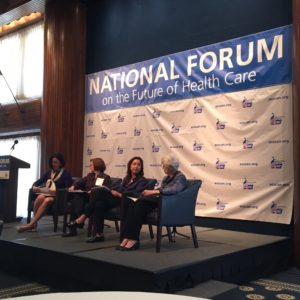NEW REPORT: Barriers to Patient Enrollment in Therapeutic Clinical Trials for Cancer
Although it’s approximated that only 3-5% of adult patients participate in clinical trials, literature reviews suggest that this number may be skewed to only represent those that participate in National Cancer Institute (NCI) sponsored trials. The highest estimates of people participating in clinical trials is 8% in both community cancer centers and NCI designated centers, with most of those centers located in urban regions.
Did you know geography may predict cancer outcomes?
According to a new report from the American Cancer Society Cancer Action Network (ACSCAN), only one in four cancer patients have access to clinical trials at a location where they receive treatment. This number is extremely low given the goals of finding effective cancer treatments and screening methods to reduce the number of individuals dying from cancer.
What barriers exist?
Despite a slightly higher estimate of enrollment, and the fact that between half to 3/4 of all patients who are eligible for clinical trials will agree to enroll, there are many barriers that keep a patient from ultimately taking part in these types of studies, including barriers at the individual, provider, and institutional level.
Commonly reported patient barriers include:
- high cost
- logistical concerns
- loss of control
- fear of side effects in their treatment
According to John MacCleod, a stage IV survivor and Fight CRC Grassroots Advisory Committee member, “the biggest barrier to clinical trial enrollment is finding the trial that’s the best fit for your disease, it’s progression, and your health. There are so many trials out there, but only a small fraction are potentially right for a single patient.”
 Providers have a responsibility to advise their patients on the best possible treatment options for their cancer, and if clinical trials are a right fit. According to ACSCAN’s Landscape Report on Barriers to Patient Enrollment in Cancer Clinical Trials, “surveys consistently show that patients with cancer who have enrolled on trials first heard of a trial from their physician, and provider recommendation is a leading factor in enrolling on a trial.” Physician communication around clinical trials can influence enrollment disparities.
Providers have a responsibility to advise their patients on the best possible treatment options for their cancer, and if clinical trials are a right fit. According to ACSCAN’s Landscape Report on Barriers to Patient Enrollment in Cancer Clinical Trials, “surveys consistently show that patients with cancer who have enrolled on trials first heard of a trial from their physician, and provider recommendation is a leading factor in enrolling on a trial.” Physician communication around clinical trials can influence enrollment disparities.
According to the report, both blacks and Hispanics are underrepresented in NCI designated trials. [Learn more about minority health challenges in the Fight CRC blog featuring Dr. Darrell Gray.]
A study published in the Journal of Theoretical Social Psychology also found racial disparities in patient and oncologist communication regarding clinical trial discussions between racial groups. African American patients generally spent less time with their oncologist and didn’t discuss clinical trials as much compared to Caucasian patients.
Action Items
According to the ACSCAN executive report:
“Clinical trials are the key step in advancing potential new cancer treatments from the research setting to the cancer care clinic, and patient participation in trials is crucial to this success.”
Huge steps in colorectal cancer treatment have been achieved within the last year thanks to clinical trials. For example, in 2017, immune checkpoint inhibitors (i.e. nivolumab/pembrolizumab) received FDA approval due to successful clinical trial outcomes. Colorectal cancer patients whose tumors express microsatellite instability now have immunotherapy options that are proven to be effective.
Based on the current state of clinical trial enrollment, and the potential they hold, 23 recommendations were developed by ACSCAN to reduce barriers for patients to take part in clinical trials.
Several of them include:
- Provider and Institutional barriers: Build and maintain a pool of diverse, research- trained staff which includes dedicated research positions as well as providers with multiple roles, with special attention to developing workforce reflective of underrepresented populations.
- Patient barriers: Present cancer patients with specifically identified trial options as part of the physician-patient treatment decision discussion using evidence- based methods.
- Trial design barriers: Encourage broad-panel biomarker testing programs to help promote simultaneous pre-screening for multiple targeted therapy trials.
- Disparities: Ensure that research sites selected for multi-site trials have diverse patient populations that reflect the broader population with cancer.
Fight CRC recognized the need to endorse ACSCAN’s recommendations to help increase access to clinical trials. This past April, Anjee Davis, Fight CRC president and expert patient advocate, participated in the ACSCAN National Forum discussing the barriers and recommendations to patient enrollment.

Acknowledging low enrollment numbers to cancer clinical trials and developing solutions to address patient, provider and institutional-level issues will ideally lead to improved enrollment numbers, ensuring patients are receiving the best care and treatment options possible.
Fight CRC took action to reduce patient barriers to clinical trials when the Late Stage MSS Clinical Trial Finder was developed. This patient curated tool prioritizes trials for late stage MSS CRC patients that have the highest potential benefit and the lowest chance of failure in one navigable area.
Read more about the trial finder!
In fact, one of the ACSCAN recommendations to decrease patient barriers includes making non-site specific trial matching and navigation services available for patients that aren’t given these trial options by their provider, which the Late Stage MSS Clinical Trial Finder addresses.
Patient’s are increasingly becoming the drivers in their own healthcare.
Creating a space where they can educate themselves before speaking with clinicians and providers is necessary to reducing trial enrolment barriers.
Fight CRC is at the forefront of discussions around barrier reduction to clinical trial enrolment and will ensure that patients receive accurate and timely information to advocate for their own healthcare.
To learn more about clinical trials, check out our clinical trial mini magazine! And if you’d like to donate to help support the clinical trial finder tool, you can do so here!
The post NEW REPORT: Barriers to Patient Enrollment in Therapeutic Clinical Trials for Cancer appeared first on Fight Colorectal Cancer.
Fight Colorectal Cancer
Comments
Post a Comment